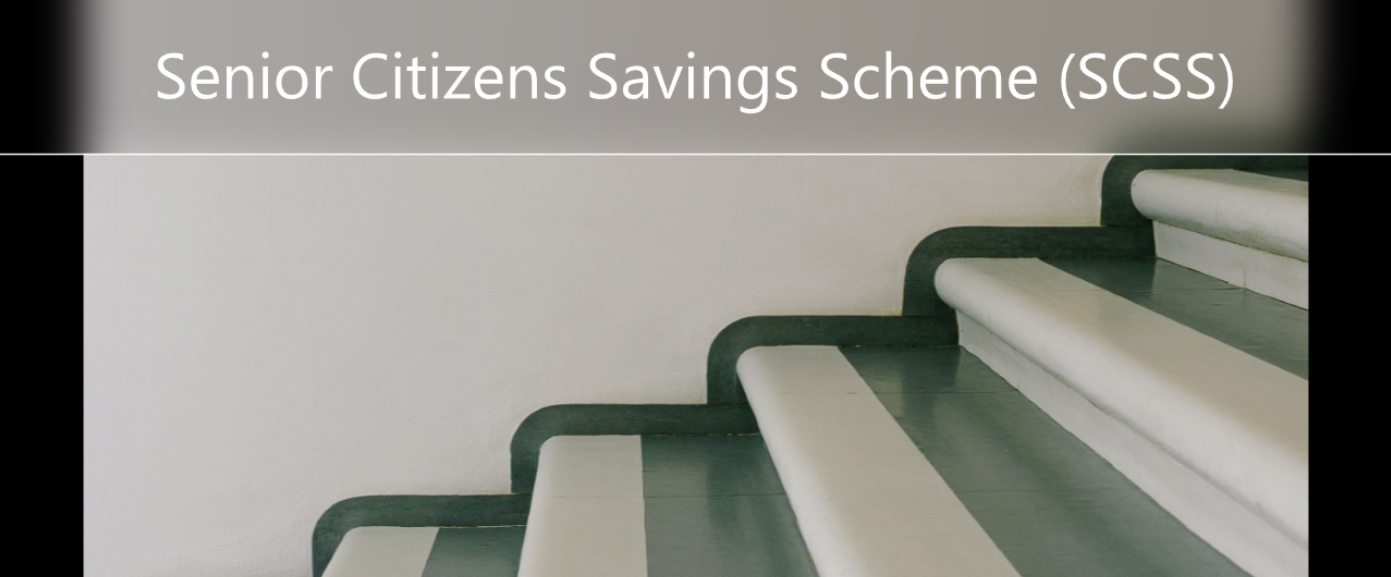The government of India launched the Senior Citizens Savings Scheme in August 2004 for senior citizens. The scheme offers a continuous income stream at better interest rates than traditional savings vehicles like bank fixed or recurring deposits. In other words, a compelling long-term savings option, SCSS is safe and is convenient to operate. In the below article, we have elucidated at length how does SCSS work in India.
Who can be an account under the Senior Citizens Savings Scheme
The rules specify who can be a depositor under the scheme, as per below:
- A person who has attained 60 years of age
- A person who has attained 55 years of age and has retired under a voluntary retirement scheme
- Retired personnel from defence services (excluding civilian Defence employees) irrespective of the age limits subject to fulfilment of certain conditions
Above all, reference to the age mentioned above is as on the date of opening of the account.
Non-resident Indians (NRI) and Hindu Undivided Family (HUF) are not eligible to open an account under these rules. However, if a depositor subsequently becomes an NRI, the SCSS account may continue until its maturity but can’t be extended.
How to open the SCSS account
To open an SCSS account is very easy. The depositor can approach any of the authorized deposit offices to open this account. The deposit centres are:
- Authorized post office in India doing savings bank work
- Banking branch authorized by Central Government to receive subscriptions under the Public Provident Funds scheme
Following documents should be submitted to open the account:
- Duly filled in account opening form (here is the link to the form – http://www.nsiindia.gov.in/writereaddata/FileUploads/FORM1.pdf)
- Identity proof like PAN card
- Address proof such as Aadhar card
- Age proof
- Passport size photographs
List of banks authorized to accept SCSS deposits
Below banks are authorized to accept deposits under the scheme:
- Andhra Bank
- Allahabad Bank
- Bank of Baroda
- Bank of India
- Bank of Maharashtra
- Canara Bank
- Central Bank of India
- Corporation Bank
- Dena Bank
- Indian Bank
- Indian Overseas Bank
- Oriental Bank of Commerce
- Punjab National Bank
- State Bank of Bikaner & Jaipur
- State Bank of Hyderabad
- State Bank of India
- State Bank of Mysore
- State Bank of Patiala
- State Bank of Travancore
- Syndicate Bank
- UCO Bank
- Union Bank of India
- United Bank of India
- Vijaya Bank
- IDBI Bank Ltd.
- ICICI Bank Ltd.
The list is available on the Reserve Bank of India website: (https://www.rbi.org.in/commonman/english/Scripts/Content.aspx?Id=1290)
Rule of deposits, withdrawal and account extension
Deposit
- Deposit possible in multiples of thousands
- Amount of deposit can be the amount received as retirement benefits or Rs 15 Lakhs, whichever is lower
- Mode of deposit:
- In cash up to Rs 1 Lakh
- By cheque or demand-draft
- An electronic method of payment
Withdrawal from SCSS
As a rule – no withdrawal is permitted for five years; however, there are a few exceptions. The depositor can withdraw the amount and close the account after one year, subject to the below conditions:
- If the account is 1-2 years old – 1.5% of the deposit is deducted
- If the account is at least 2years old – 1% of the deposit is deducted
- In case the depositor has extended beyond the initial period, withdrawal is possible after one year of the extended period without any penalty
Link to loan/withdrawal application form – http://www.nsiindia.gov.in/writereaddata/FileUploads/FORM%203.pdf
Form for premature closure of account – http://www.nsiindia.gov.in/writereaddata/FileUploads/FORM%208.pdf
Extension of the SCSS account
- Within one year after the date of maturity, the depositor may make an application to extend the account for three years
- The deemed extension is from the original maturity date
Link to account extension form – http://www.nsiindia.gov.in/writereaddata/FileUploads/FORM%206.pdf
Benefits of Senior Citizens Savings Scheme
- Government-sponsored scheme and is trustworthy and reliable
- Regular income as interest gets paid quarterly
- Simple process to open the account and manage the deposits
- Generous rate of interest as compared to bank deposits
- Lock-in ensures savings remain intact, but at the same time, enough operating flexibility
- Nomination facility available
- The principle amount of deposit is claimable as a deduction under section 80C of the Income Tax Act of India
How to add a nominee to SCSS account
The depositor can nominate a person or persons at the time of opening the account. The nominee will be entitled to payment from the account in case of the death of the depositor.
You can add a nominee later by submitting information in the relevant form if not done while opening the account.
A nomination is also possible in the case of a joint account. Herein, the joint holder will be entitled to the payment first in case of the depositor’s death. Therefore, the nominee’s claim will only arise after the passing away of both the depositor and the joint holder.
Please note that only a registered nomination at the deposit office is valid. Therefore, the account owner must register any change in nominee at the deposit office.
Form to cancel or modify nominee – http://www.nsiindia.gov.in/writereaddata/FileUploads/FORM%2010.pdf
Calculation of interest on deposits
Interest is payable every quarter on the deposits made under the SCSS. Therefore, the interest credit happens as per the below schedule:
| For the quarter ending | Interest credited on |
| 31st March | 1st working day of April |
| 30th June | 1st working day of July |
| 30th September | 1st working day of October |
| 31st December | 1st working day of January in the following year |
In the case of a new account, the first interest credit is for the proportionate number of days in that quarter. So, for instance, if you open an account on 10th August, the first interest is paid on the 1st working day of October for interest earned from 10th August to 30th September. After that, the quarterly payment schedule continues.
The current interest rate under the Senior Citizens Savings Scheme (SCSS) is 7.4% paid quarterly. The historical interest rate chart is as per below:
| From | To | Interest Rate |
| 02-08-2004 | 30-11-2011 | 9.00 |
| 01-12-2011 | 31-03-2012 | 9.00 |
| 01-04-2012 | 31-03-2013 | 9.30 |
| 01-04-2013 | 31-03-2014 | 9.20 |
| 01-04-2014 | 17-11-2014 | 9.20 |
| 18-11-2014 | 20-01-2015 | 9.20 |
| 21-01-2015 | 31-03-2015 | 9.20 |
| 01-04-2015 | 31-03-2016 | 9.30 |
| 01-04-2016 | 30-09-2016 | 8.60 |
| 01-10-2016 | 31-03-2017 | 8.50 |
| 01-04-2017 | 30-06-2017 | 8.40 |
| 01-07-2017 | 31-12-2017 | 8.30 |
| 01-01-2018 | 30-09-2018 | 8.30 |
| 01-10-2018 | 31-12-2018 | 8.70 |
| 01-01-2019 | 31-03-2019 | 8.70 |
| 01-04-2019 | 30-06-2019 | 8.70 |
| 01-07-2019 | 30-09-2019 | 8.60 |
| 01-10-2019 | 31-12-2019 | 8.60 |
| 01-01-2020 | 31-03-2020 | 8.60 |
| 01-04-2020 | 30-09-2020 | 7.40 |
Source: Indiapost website
Other points:
- No interest will accrue on the quarterly interest if not claimed by the depositor
- Interest gets rounded off to the nearest rupee
- Interest on account continued after maturity shall be calculated as per the interest applicable to new deposits or accounts opened on the date of maturity. Therefore, one can expect a change in interest rate
Closure of the account
The deposit office will pay back the amount on or after the expiry of the five years. It is mandatory to produce the passbook, a written application and required forms to get the money back into the account.
If the depositor dies before maturity, the account shall be closed and the deposit refunded. The total amount repaid is the deposit amount along with interest till the death of the depositor. After that, the amount gets paid to the nominee or legal heir in case of no nomination.
Simple interest gets paid from the date of death of the depositor until the date of refund. After that, the interest rate will be as provided under Post Office Savings Accounts Rules.
If the spouse is the sole nominee, or it is a joint account, the spouse may continue the account on the existing terms. In other words, the spouse can continue the account upon the first holder’s death even if the spouse does not meet the mandatory age criteria.
However, if the spouse does not wish to continue, the account can be closed, refunding the deposit. Above all, no deduction for premature withdrawal is applicable in case of closure due to the account holder’s death.
Form for the closure of the account – http://www.nsiindia.gov.in/writereaddata/FileUploads/FORM%209.pdf
Form for settlement of the account of deceased depositor – http://www.nsiindia.gov.in/writereaddata/FileUploads/FORM%2011.pdf
Transfer of account
The depositor can apply for a transfer of account by submitting the passbook and FORM G to initiate the transfer. Further, a transfer fee of Rs 5 per lakh of deposit for the first transfer and Rs 10 per lakh for any subsequent transfer shall be payable.
Link to the transfer of account form – http://www.nsiindia.gov.in/writereaddata/FileUploads/FORM%205.pdf
Account opened by breach of rules
An account opened in contravention of rules is immediately closed upon finding a breach of regulations. The deposit amount is refunded. Interest, if any, paid on such a deposit is deducted from the refund.
Annexure – link to some of the other forms
| Link |
| Pay-in slip
http://www.nsiindia.gov.in/writereaddata/FileUploads/FORM1.pdf |
| Passbook
http://www.nsiindia.gov.in/writereaddata/FileUploads/FORM%204.pdf |
| Pledge account
http://www.nsiindia.gov.in/writereaddata/FileUploads/FORM%207.pdf |
| Granting a letter of authority
http://www.nsiindia.gov.in/writereaddata/FileUploads/FORM%2012.pdf |
| Affidavit
http://www.nsiindia.gov.in/writereaddata/FileUploads/FORM%2013.pdf |
| Letter of disclaimer
http://www.nsiindia.gov.in/writereaddata/FileUploads/FORM%2014.pdf |
| Indemnity letter
http://www.nsiindia.gov.in/writereaddata/FileUploads/FORM%2015.pdf |
*Source: National Savings Institute website
The author is a senior finance professional with over fifteen years of work experience in corporate finance and has an affinity for personal finance and investment management. Please leave your comment or share thoughts on this article via email at decodefinance.in@gmail.com. For more articles, please visit the website www.decodefinance.in.
Disclaimer:
The author has used his knowledge, experience, and understanding of the subject to write this article. Any views, opinions, and thoughts mentioned in the article belong solely to the author and not necessarily to the author’s employer (past or current), organization, committee, or other group or individual.
Under any circumstances, the author shall not be liable for any views or analysis expressed in this note. Further, the opinions expressed are not binding on any authority or Court. We advise readers to consult their financial advisor for assistance in their specific case.




